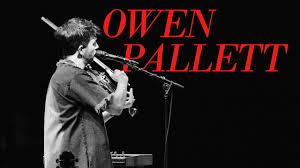 SOUNDTRACK: THE DISTRICTS-A Flourish and a Spoil (2015).
SOUNDTRACK: THE DISTRICTS-A Flourish and a Spoil (2015).
 A Flourish and a Spoil feels like an extension of The Districts‘ EP. And that’s no bad thing.
A Flourish and a Spoil feels like an extension of The Districts‘ EP. And that’s no bad thing.
It’s got more of the same vibrato guitars and thumping bass all wrapping around Rob Grote’s angsty voice. The big difference from the EP is that most of the songs are shorter (around four minutes with the exception of the end of the album).
A propulsive bass opens up the super catchy “4th and Roebling.” The song starts somewhat quietly but turns into a raucous brawl by the end with crashing cymbals, smacking drums, and the whole band singing along.
“Peaches” has a fuller sound as the whole band plays the main parts until the catchy chorus where the guitar gets to play the lead melody along with the vocals. “Chlorine” starts loud and then slows down for the verses. Followed by the catchy chorus which is bigger and louder. “Hounds” is built out of a simple riff that is played with a little delay so that it lurches interestingly until the shambolic ending of “hounds in my head, hounds in my head.”
“Sing the Song” is a slower song with a loud but spare chorus. It’s got a rousing ending and then a lovely delicate denouement.
“Suburban Smell” is under three minutes. It’s a pretty acoustic song with some lovely guitar melodies and Grote’s more delicate vocals (and yes, there’s a questionable lyric in there). The song ends with a mic shutting off, like a real bedroom recording. It’s followed by a full on echoing drum intro of “Bold.” The song is full of noises and sounds like a song in search of something. It finds it with the soaring catchy ending section, fast chords, highs notes and a powerful repetition.
“Heavy Begs” is the last short song on the record. It features the one thing that has been missing: some “oohs” (although only once). It’s also got a new sound introduced in the guitar solo–a buzzing that works nicely with their overall sound.
“Young Blood” stretches out to almost nine minutes. After a siren-like introduction, the song settles into a relaxed lope with catchy vocal melody. The first four minutes jump back and forth between verses an chaotic crashing chorus. Then comes a pause followed by a quiet bass line while the other instruments slowly add sounds and melodies (and what sounds like a party in the background). This instrumental section builds on itself for two minutes until the coda. The quiet “it’s a long way down from the top to the bottom” which repeats until the drums start pounding before the final guitar solo takes the song out with a riff that sounds like it came from Built to Spill.
That feels like an album ender to me, but they put in one more song, the nearly 6 minute “6AM.” This song also sounds like a bedroom recording–it sounds raw and rough–and it never sounds too long.
[READ: September 30, 2020] “Rainbows”
I liked the way this story seemed to be settling into a time frame and then leaped away from it to move on to something else.
The story is told in first person, by an Irish woman named Clodagh. She came to America when she was twenty-three. She’d never heard of mentors or office hours or anything like that in an educational system. She was getting a Master’s Degree in Applied Analytics.
She decided to audit a class in anthropology just to take her mind off the degree. The teacher, Paola Visintin, became something of an unexpected mentor to her. Paola was twenty years older, but cool in a way that younger teachers weren’t. The bonded in coffee shops and talked about many of Clodagh’s problems. Paola’s answers were short, direct and sometimes beside the point.
The passage of time is delivered in a fun way:
My kitten grew into a cat, turned into an old lady, died. The obstetrician lifted a red-blue creature from behind a blue paper curtain–and, flash, the creature, Aoife, turned eighteen. (more…)

















 SOUNDTRACK: BAND OF HORSES-Cease to Begin (2008).
SOUNDTRACK: BAND OF HORSES-Cease to Begin (2008). Our friends Eugenie and Jarret introduced us to Band of Horses. We liked the first one so much we couldn’t wait for the release of this follow up. And it doesn’t disappoint.
Our friends Eugenie and Jarret introduced us to Band of Horses. We liked the first one so much we couldn’t wait for the release of this follow up. And it doesn’t disappoint.